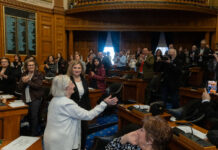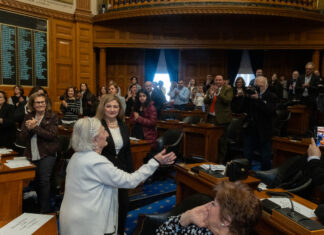By Aram Arkun
Mirror-Spectator Staff
BOSTON — An impressive evening of prayers, music and sermons at Trinity Church in Boston on April 23 began the Boston community’s joint commemoration of the centennial of the Armenian Genocide. Trinity Church was full, with some 1,450 guests. This ecumenical and interfaith event was followed the next morning by a joint service by all Armenian clergy of the area at Holy Trinity Armenian Church in Cambridge, which also was packed, with 700 worshippers.
Trinity Church was a fitting host for the commemoration, as before the Armenians established their own churches in the Boston area, it had been the first church to open its doors to them. The Massachusetts Council of Churches in cooperation with the Armenian clergy of Massachusetts presented the evening as part of the events organized by the Massachusetts Committee to Commemorate the Armenian Genocide (MCCAG).
Rev. Samuel T. Lloyd III of Trinity Church welcomed the guests to the venerable and beautiful 19th century church, and recalled that Trinity Church previously hosted the commemoration of the 85th anniversary of the Armenian Genocide. Anthony Barsamian, co-chair of the MCCAG spoke words of welcome before introducing college student Ani Karabashian, a descendant of Aurora Mardiganian, the famous Armenian Genocide survivor whose life story was turned into a movie and book as part of Near East Relief fundraising efforts to aid other survivors. Barsamian and many other speakers referred to Pope Francis’s statement on the Armenian Genocide. He thanked all who participated that evening, and said they were “bandaging our bleeding wounds.” Armenians still remind the world that a crime unpunished will be repeated, and join in bandaging the wounds of others.
Bishop Gayle E. Harris, of the Episcopal Diocese of Massachusetts, introduced the Vespers Service and two interfaith guests. She later that evening declared that the suffering of the Armenian martyrs was woven into the tapestry of our own souls. Denial perpetuates the Genocide, as does silence. To take the pain of the Armenians, and bind their wounds, she declared that though a black woman, “I am an Armenian too. My people suffered, and continue to suffer, and in that suffering we are grafted together but in the hope, in the light that we share, we bring hope and light to this world.”









